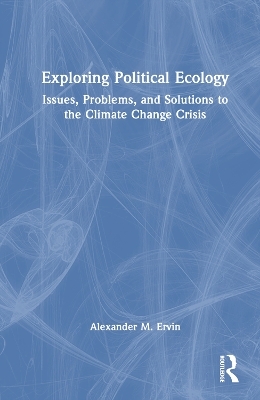
Exploring Political Ecology
Routledge (Verlag)
978-1-032-80146-9 (ISBN)
This book explores some of the conditions and underlying causes of the multiple environmental crises facing humanity. Rooted in anthropology, but multidisciplinary in scope, it surveys the many socio-cultural and socio-economic errors, foibles, and follies that brought us to these circumstances. Crucially and uniquely, it outlines an array of viable and practical solutions, some of which are radically different from the current status quo and cultural expectations. The first chapter canvasses the emerging, interdisciplinary field of political ecology, then Part I examines details and trends in agriculture. Part II portrays the threats posed by carbon dependent and combustive technologies as well as the hydro and nuclear energy systems now powering the majority of human actions in developed parts of the world and expanding beyond. The third part turns to consider solutions, including green new deals, de-growth policies, localization, agroecology, alternative energy systems, and many more possibilities. The conclusions engage with urgent moral and legal issues and outline social movement strategies—all related to our collective neglect of climate change—and then finally speculate upon possible futures. This book is key reading for researchers and students interested in climate change across the social and physical sciences and humanities.
Alexander M. Ervin (PhD Illinois) is Professor Emeritus, Anthropology, University of Saskatchewan where he taught and researched for 51 years. His specialities include environmental anthropology, socio-cultural change, and applied anthropology. He is a past president of the Society for Applied Anthropology. His books include Canadian Perspectives in Cultural Anthropology (2001), Applied Anthropology: Tools and Perspectives for Contemporary Practice (2005) and Cultural Transformations and Globalization: Theory, Development, and Social Change (2015).
Chapter 1—What is Political Ecology?; Part I: Agriculture; Chapter 2—Overview of Global Food Production: Pressures to Industrialize; Chapter 3—Field Crops: Grains and Soy; Chapter 4– Livestock Production; Chapter 5—Who Really "Feeds a Hungry World"? Part II: Energy; Chapter 6—Coal; Chapter 7—The “Devil’s Excrement”—Petroleum; Chapter 8—Hydroelectric and Irrigation Dams; Chapter 9—Uranium and Nuclear Power: The Case Against; Part III: Solutions; Chapter 10—Transforming our Political Economies and Dealing with the Issue of Constant Growth; Chapter 11—Some Solutions in Agriculture; Chapter 12—Renewable Energy Solutions; Part IV: Conclusions; Chapter 13—The Big Moral Question; Chapter 14—What Might Happen Next?
| Erscheinungsdatum | 03.09.2024 |
|---|---|
| Verlagsort | London |
| Sprache | englisch |
| Maße | 152 x 229 mm |
| Gewicht | 660 g |
| Themenwelt | Naturwissenschaften ► Biologie ► Ökologie / Naturschutz |
| Sozialwissenschaften ► Ethnologie | |
| Sozialwissenschaften ► Soziologie | |
| Technik ► Umwelttechnik / Biotechnologie | |
| ISBN-10 | 1-032-80146-8 / 1032801468 |
| ISBN-13 | 978-1-032-80146-9 / 9781032801469 |
| Zustand | Neuware |
| Haben Sie eine Frage zum Produkt? |
aus dem Bereich


